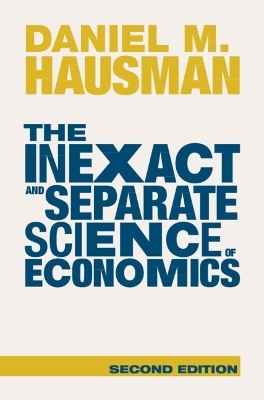
The Inexact and Separate Science of Economics
Cambridge University Press (Verlag)
978-1-009-32029-0 (ISBN)
Is economics a science? What distinguishes it from other sciences, both natural and social? Like many of the natural sciences, its theories are mathematically complex. Yet, like the social sciences, its 'laws' are largely everyday generalizations. Can such generalizations, which are far from universal truths, constitute a science? Does economics have a distinctive method? The first edition answered these and other questions about the scientific status of economics and its underlying methodology. In this fully updated new edition, Dan Hausman reflects on developments in both economics and the philosophy of economics over the last thirty years. It includes a new chapter on the methodology of macroeconomics, an updated discussion on the use of models, and new discussions causal inference and behavioural economics and their implications for theory appraisal. It is the perfect choice for a new generation of students studying the methodology of modern economics.
Daniel M. Hausman is the author of seven books and nearly 200 essays on issues at the boundaries between economics and philosophy. With Michael McPherson, he is the co-founder and former editor of the journal, Economics and Philosophy. In 2009, Hausman was elected to the American Academy of Arts and Sciences.
Part I. Introduction: Content, Structure and Strategy of Mainstream Economics: 1. Rationality, preferences and utility theory; 2. Demand and consumer choice; 3. Theory of the firm and general equilibrium; 4. Equilibrium theory and normative economics; 5. Equilibrium theory and macroeconomic models; 6. Models and theories in economics; 7. The structure and strategy of economics; 8. Overlapping generations: a case study; Part II. Theory Assessment: 9. Inexactness in economic theory; 10. Mill's deductive method and the assessment of economic hypotheses; 11. Methodological revolution; 12. Karl Popper, Imre Lakatos: Falsificationism and research programs; 13. The inexact deductive method; 14. Casting off dogmatism: the case of preference reversals; Part III. Conclusion: 15. Economic methodology; 16. Conclusions.
| Erscheinungsdatum | 31.05.2023 |
|---|---|
| Zusatzinfo | Worked examples or Exercises |
| Verlagsort | Cambridge |
| Sprache | englisch |
| Maße | 152 x 229 mm |
| Gewicht | 995 g |
| Themenwelt | Geisteswissenschaften ► Philosophie |
| Wirtschaft ► Allgemeines / Lexika | |
| Wirtschaft ► Volkswirtschaftslehre | |
| ISBN-10 | 1-009-32029-7 / 1009320297 |
| ISBN-13 | 978-1-009-32029-0 / 9781009320290 |
| Zustand | Neuware |
| Informationen gemäß Produktsicherheitsverordnung (GPSR) | |
| Haben Sie eine Frage zum Produkt? |
aus dem Bereich


